Fixing the system
“Should a Democrat in a blue district like Portland even bother to engage with Democratic legislators?”
I was asked this question over beers this past week by a friend (and reader of this Substack). In my last post, I wrote about systemic issues I have opinions about, including better oversight of money in politics, federal agencies, and Supreme Court ethics. I also believe that these are not partisan issues but ones that should be supported by the majority of Americans and thus the majority of legislators no matter what district they come from. As such, I do believe that civic engagement can play a major role in my journey to communicating these opinions, starting with phone calls and engaging next in town hall meetings or in-person meetings. I also want to spread the word from time-to-time to people I know via this Substack!
What AI said
I asked Microsoft CoPilot my friend’s question about whether it’s worth engaging legislators, and I got a very succinct (and accurate) response.
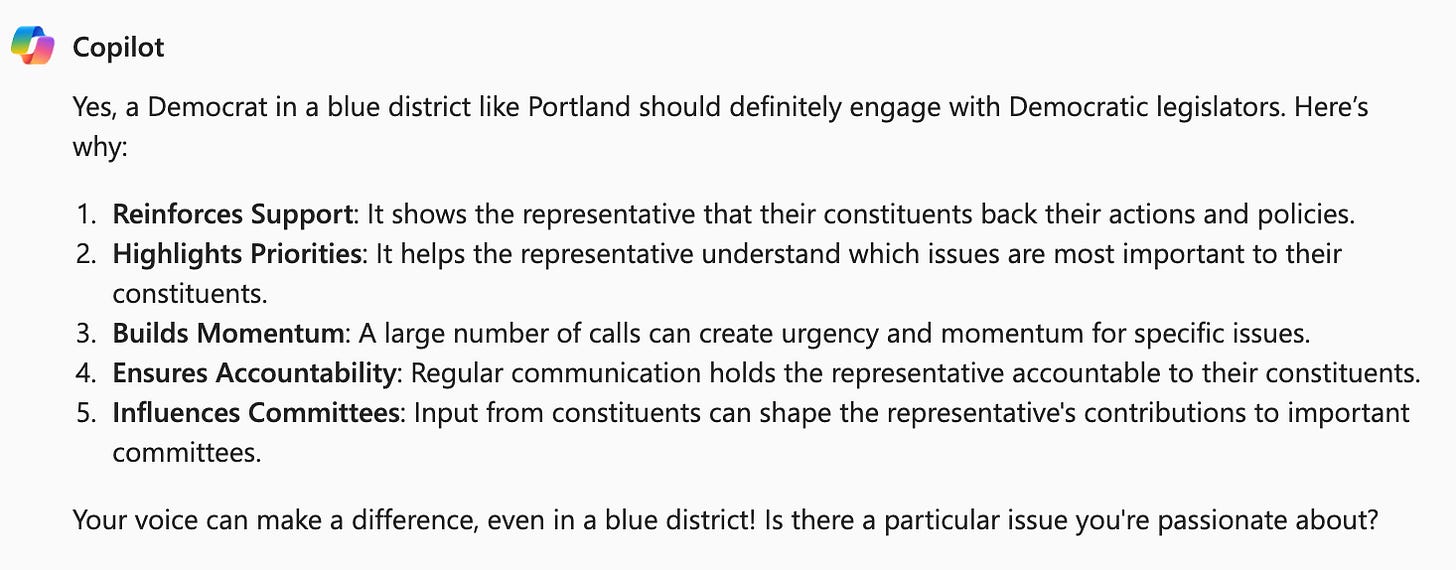
I agree with all of these points generated by AI. They sort of fall into the “fight the good fight” category. That said, somehow I believe these reasons somehow miss a key point that there’s an opportunity to generally reinforce to politicians that most people really want the same things, independent of political persuasion.
People agree on many things
As a general belief, my intention here isn’t to be overly partisan here. Before getting too far, I wanted to point out that Americans generally agree on a lot of things.
Examples include that the president should never lie, the president should unite our country, Russia is our enemy, and that US representatives should be more bipartisan and compromise more. (Source: Yougov polling data as reported by CBS News). While somewhat decent fodder for doomscrolling or entertaining television (depending on one’s party affiliation), the partisanship on display during last week’s address by the President in front of Congress doesn’t really reflect the direction that most Americans desire for the country.
All sides agree the system itself is broken
The one thing I’d advocate for is to fix the system itself. Surveys continue to demonstrate that most of us in America see the problems with our political system. There is so much partisanship, and it’s exacerbated by the cost of running political campaigns and the extreme special interests that fund political campaigns. Contrary to the belief that people view members of opposing political parties as “evil,” most Americans actually believe that ordinary Americans want the political system to work well.
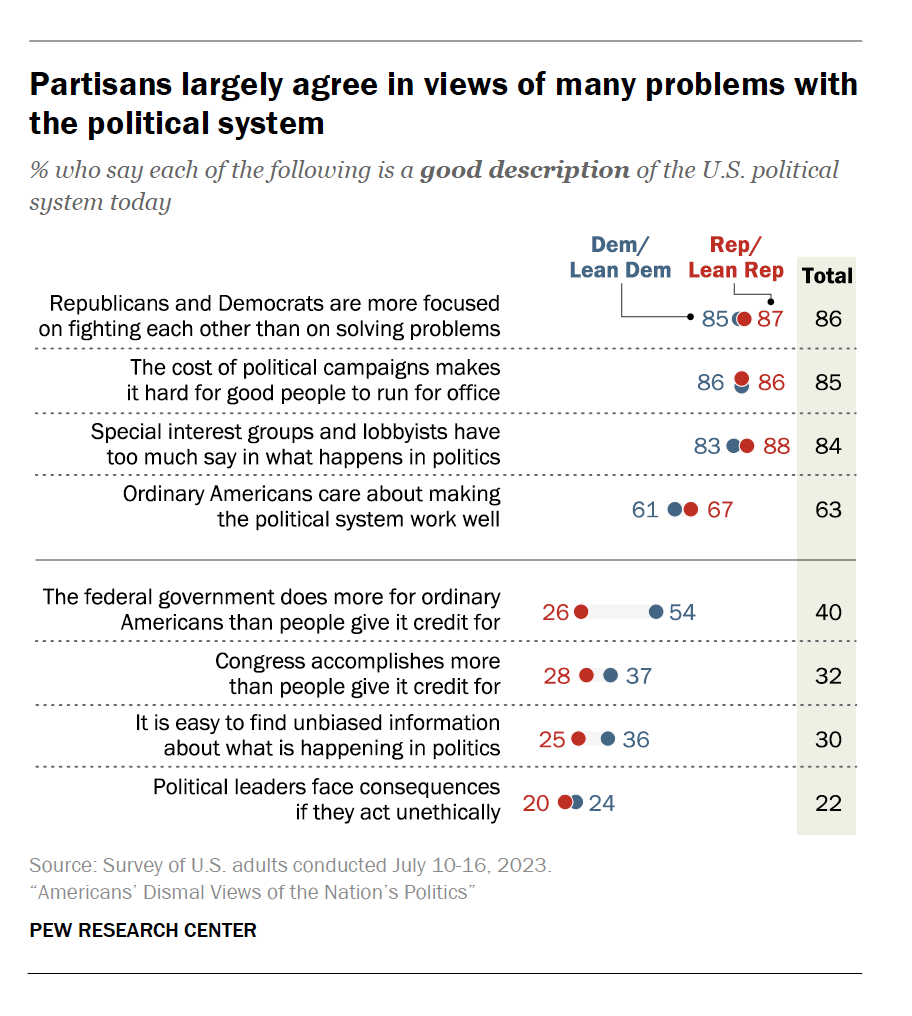
Deviation from the system’s design
The American system was originally designed such that Congress would be made up of people who represented the interests of their constituents rather than their party.
De Tocqueville wrote about this design in the 19th century in Democracy in America.
“In a democratic country like the United States a Representative has hardly ever a lasting hold on the minds of his constituents. However small an electoral body may be, the fluctuations of democracy are constantly changing its aspect; it must, therefore, be courted unceasingly. He is never sure of his supporters, and, if they forsake him, he is left without a resource; for his natural position is not sufficiently elevated for him to be easily known to those not close to him; and, with the complete state of independence prevailing among the people, he cannot hope that his friends or the government will send him down to be returned by an electoral body unacquainted with him. The seeds of his fortune are, therefore, sown in his own neighborhood; from that nook of earth he must start, to raise himself to the command of a people and to influence the destinies of the world. Thus it is natural that in democratic countries the members of political assemblies think more of their constituents than of their party, whilst in aristocracies they think more of their party than of their constituents.”
— Alexis de Tocqueville, Democracy in America Volume II
While even in the 19th century, the real world didn’t perfectly conform to this design, I believe that the Pew research cited above demonstrates crippling “fighting each other” between the parties, even though constituents across the political spectrum agree on many seemingly contested issues.
A problematic example - TCJA & Medicaid
One example of where the interests of most constituents and the political parties conflict is with the TCJA (Tax Cuts and Jobs Act), also known as the 2017 Trump tax cuts. These tax cuts are set to expire this year, but Trump has made extending these tax cuts a core part of his and the Republican party’s political agenda.
However, among legislators on both sides, there are two widely understood statistics:
Impact on debt. Extending the TCJA provisions would result in an increase of $4 trillion in national debt over the next 10 years, according to the Congressional Budget Office.
Disproportionately favoring the rich. About half of the tax savings associated with extending the TCJA provisions would go to the highest-income 5 percent of households, according to the Tax Policy Center.
In trying to pass a budget endorsed by Trump, Republican Congress people are trying to work in the Trump tax cuts. It will be impossible to implement these tax cuts without cutting into widely used social programs, including Medicaid. Of course, supporting this party position causes problems for Republican legislators with their constituents. According to a recent survey, over 60 percent of Trump voters and Republicans believe Medicaid should be either increased or kept about the same.
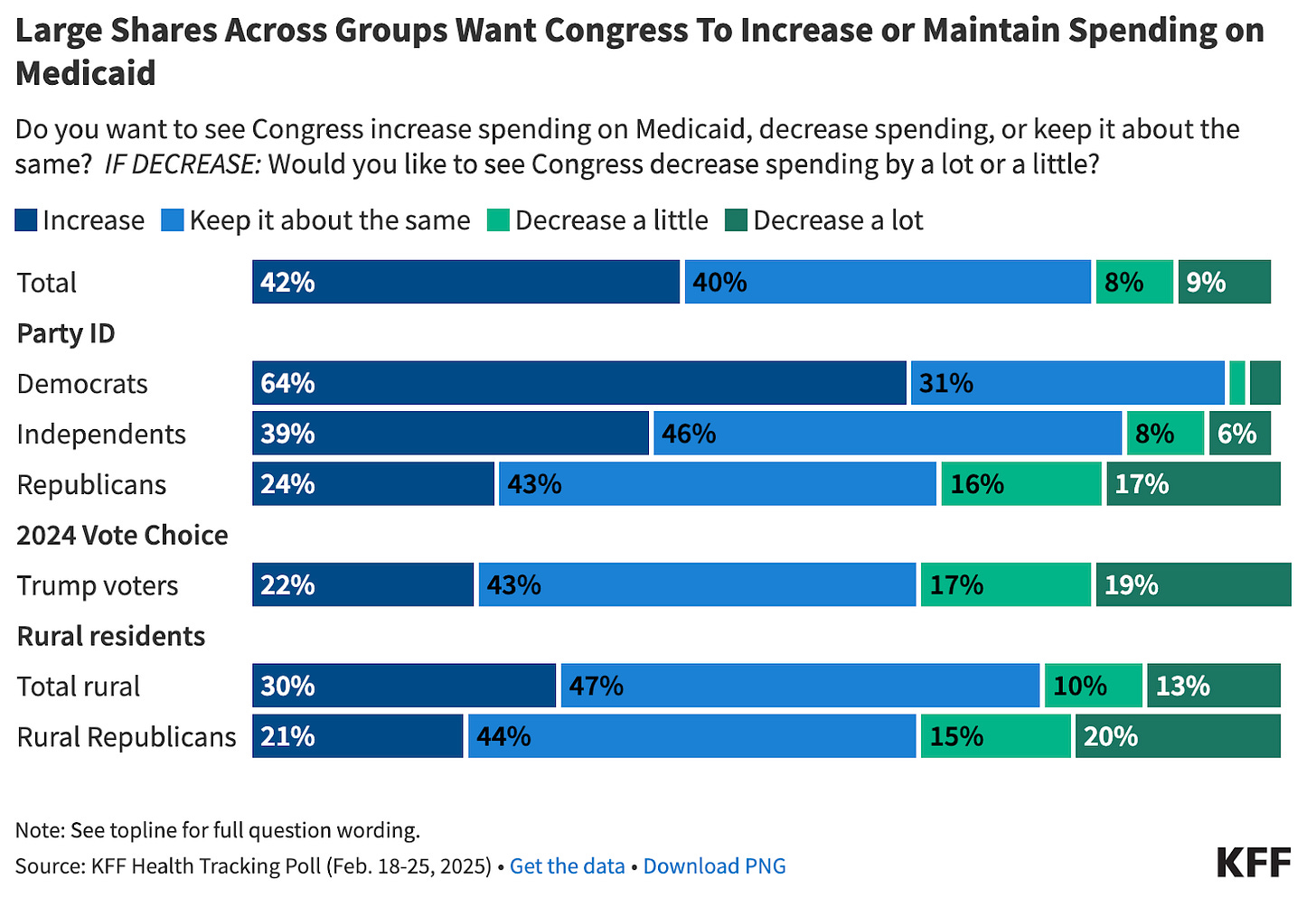
The problem for the President and the Republican Party is that, on the campaign trail, Trump promised wealthy donors extensions to the TCJA provisions.
“You’re all people that have a lot of money. I know 20 of you, and you’re rich as hell. We’re gonna give you tax cuts...”
— Donald Trump, as seen on X
As such, the President is making aggressive demands on social media calling for “NO DISSENT” among Republican legislators.
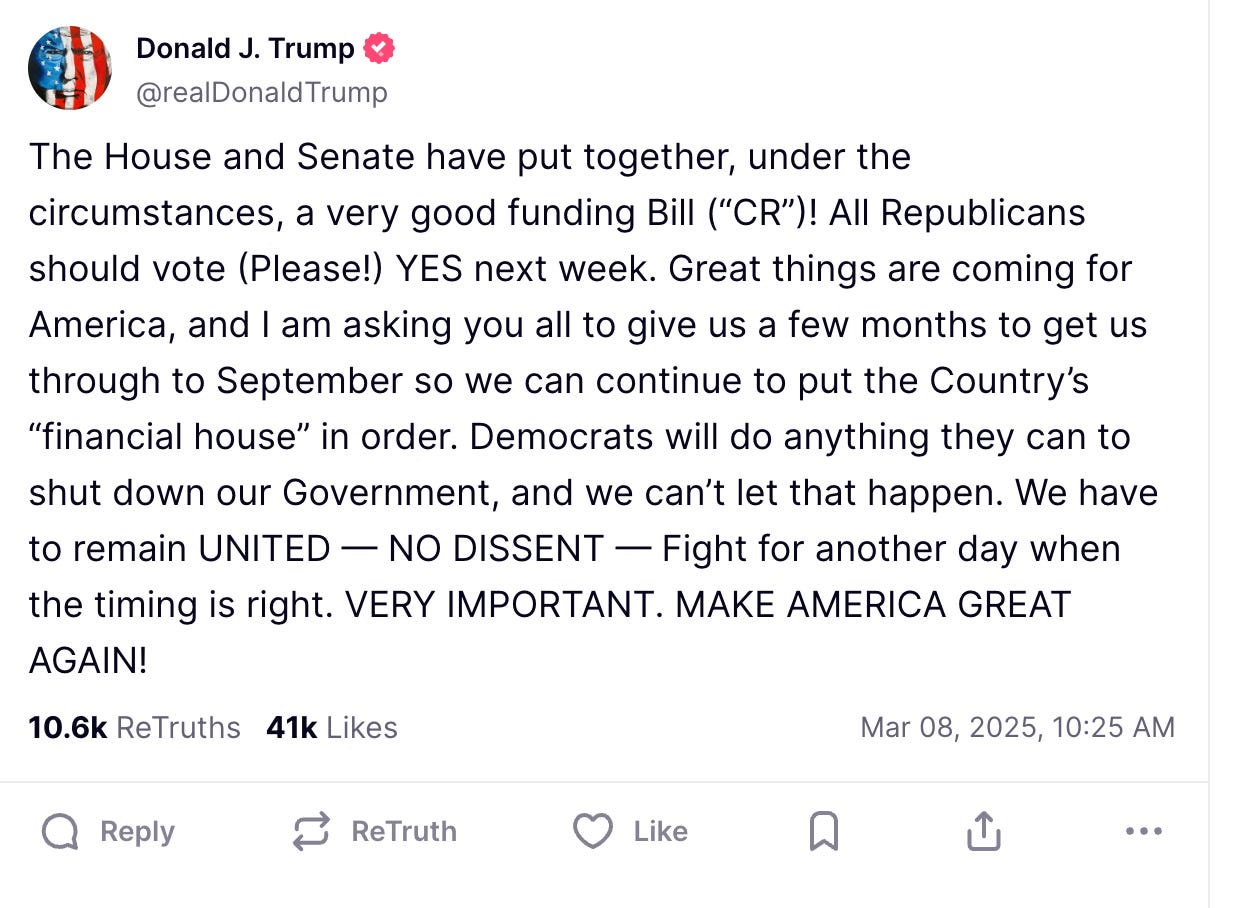
Democrats — Fighting for Medicaid Itself
On the Democratic side, a problem here is that legislators are not taking the approach of fixing the system itself but rather focusing on downstream issues. I was at a town hall meeting last week held on Facebook Live by Senator Ron Wyden of Oregon. I really appreciated that he conducted this town hall with us rather than go to the Trump address in front of Congress the same night.
I also appreciated that the event featured real questions and concerns from people in Oregon. At that event, Senator Wyden was extremely declarative about his own priority.
“That's my commitment to you until we're through with this every single day. I have no higher priority than to protect Medicaid.”
— Sen. Ron Wyden at his March 4, 2025 town hall meeting
This commitment is admirable, as it's a position shared by constituents who are both Democrat and Republican. Still, it’s a commitment to just one issue or program. If we go back to the reasons why such a popular program like Medicaid is even up for debate, it’s because of a problem with the system — money in politics.
It doesn’t stop with a single issue
Beyond Medicaid, consider the issue of DOGE and Elon Musk. Independent of political party, most people recognize that the outsized influence of Elon Musk in the current administration was the result of spending $277 million on the 2024 election cycle,
A recent survey showed that both Democrats and Republicans feel that Elon Musk is having “a lot of influence” on the Trump administration but far less feel that he should have this level of influence (63% vs. 16%). 85% of Democrats view Musk as being highly influential in the Trump administration, while 7% say they want him to be. Among Republicans, 49% view Musk as highly influential, compared to 29% who say they want him to be.
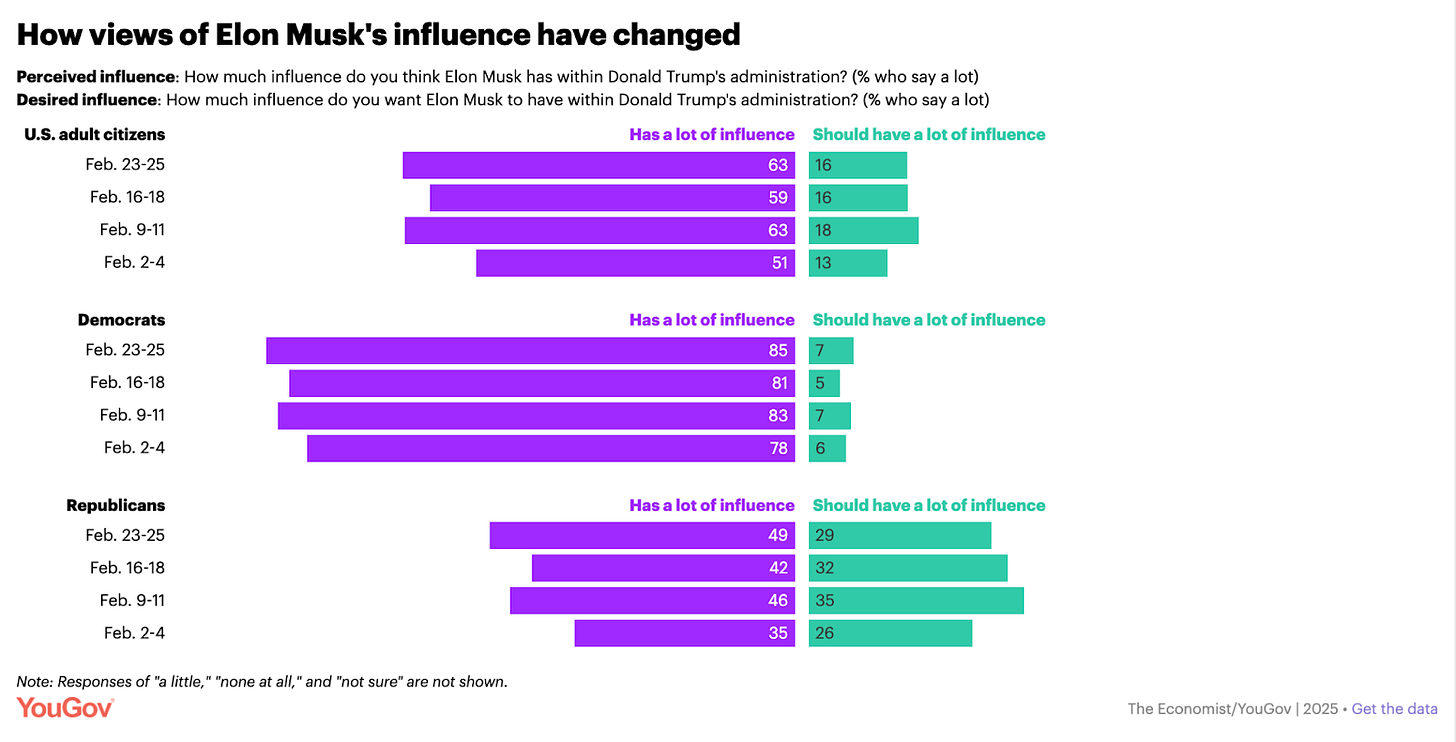
These findings are not surprising. While people’s opinion on Elon Musk as an individual or the efficacy of the DOGE team can vary, most people don’t believe that the system should work this way. According to research conducted by Pew Research in 2018, most Americans acknowledged that big donors have outsized influence on the process and wanted to impose limits on campaign spending.
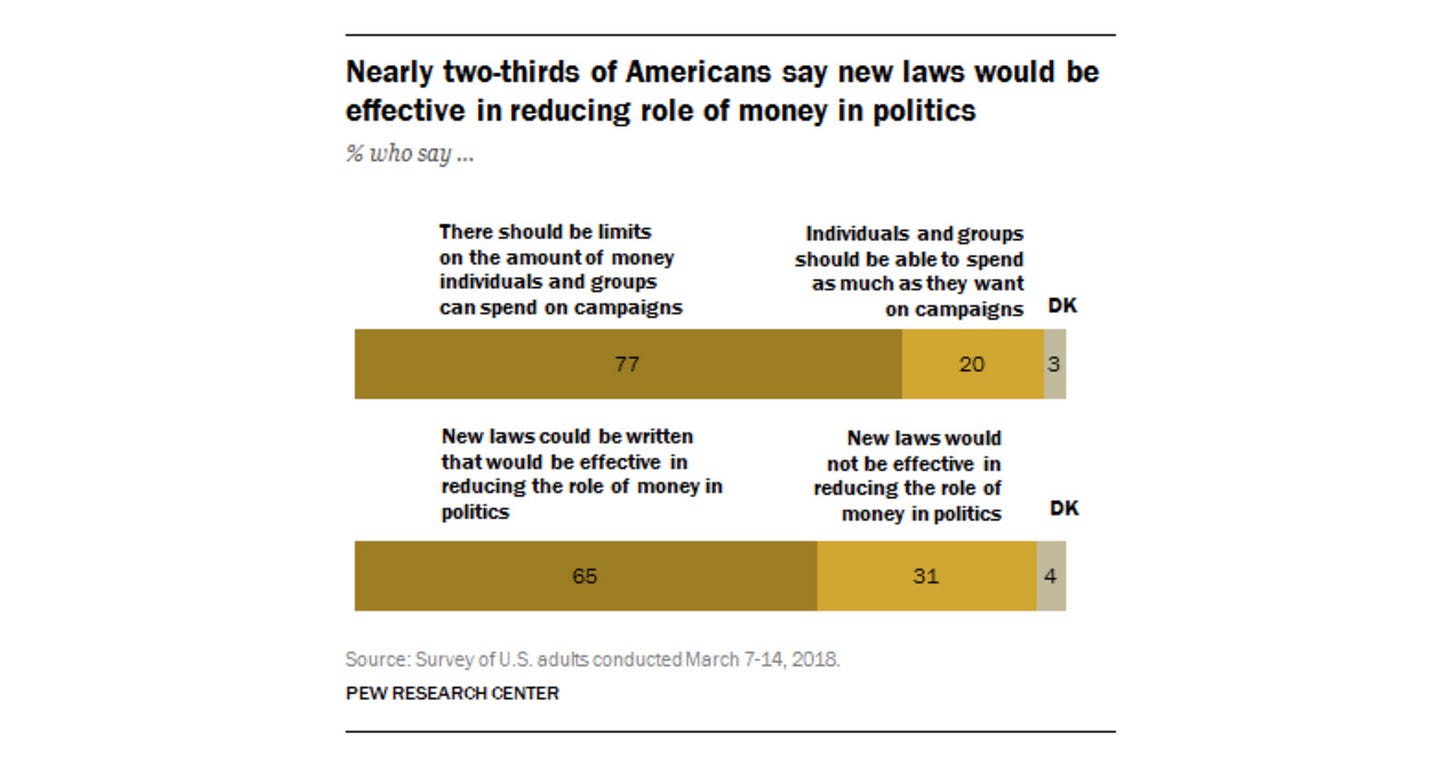
So why don’t we fix the system itself?
As mentioned above, I recently attended a virtual town hall for Senator Wyden. Just after that event, I also attended a later one by Senator Jeff Merkley.. (I missed the town hall with Representative Suzanne Bonamici in Portland on February 21st.) I believe these events are a great opportunity for the representatives to hear from their constituents, and I found the senators to be very responsive to the people in attendance. Unfortunately, the people in attendance didn’t talk about the system itself.
Constituents came with their personal stories and prepared position statements, most typically on issues personally important to them, spanning a wide range of issues, including Medicaid, Medicare, job losses in Federal agencies, immigration, wildfire response, USAID and confirming Marco Rubio, measles outbreaks and confirming RFK, Jr., and many others. The list of topics was somewhat overwhelming, and there wasn’t a clear takeaway or theme.
In contrast, I’d like to advocate for fixing the system itself. Here some messages I plan to extend from phone calls to face-to-face interactions:
Let’s legislate money out of politics so that we stop doing things like supporting tax cuts for the rich, cutting programs for the poor, and allowing a billionaire unbridled access into critical government systems.
Let’s legislate a more formal oversight process over federal agencies. We all want to cut waste and fraud, but the DOGE executive order driven by a billionaire donor wasn’t the way to do this.
Let’s pass into law a code of ethics for the Supreme Court, so we can fight the influence of special interest groups there, too.
On a separate note, I remain disappointed that Republican legislators are now being advised to not run in-person town hall meetings. These types of actions should not be considered normal, and are also not a part of the design of the American system.
For those who are in districts that will have town halls, I encourage you all to attend them. The House is in recess from March 13-23. The Senate is in recess from March 17-23. Also, per the advice on 5calls.org, try to set up an in-person meeting if there isn’t going to be a town hall.
Will you join me in the focus on fixing the American political system?



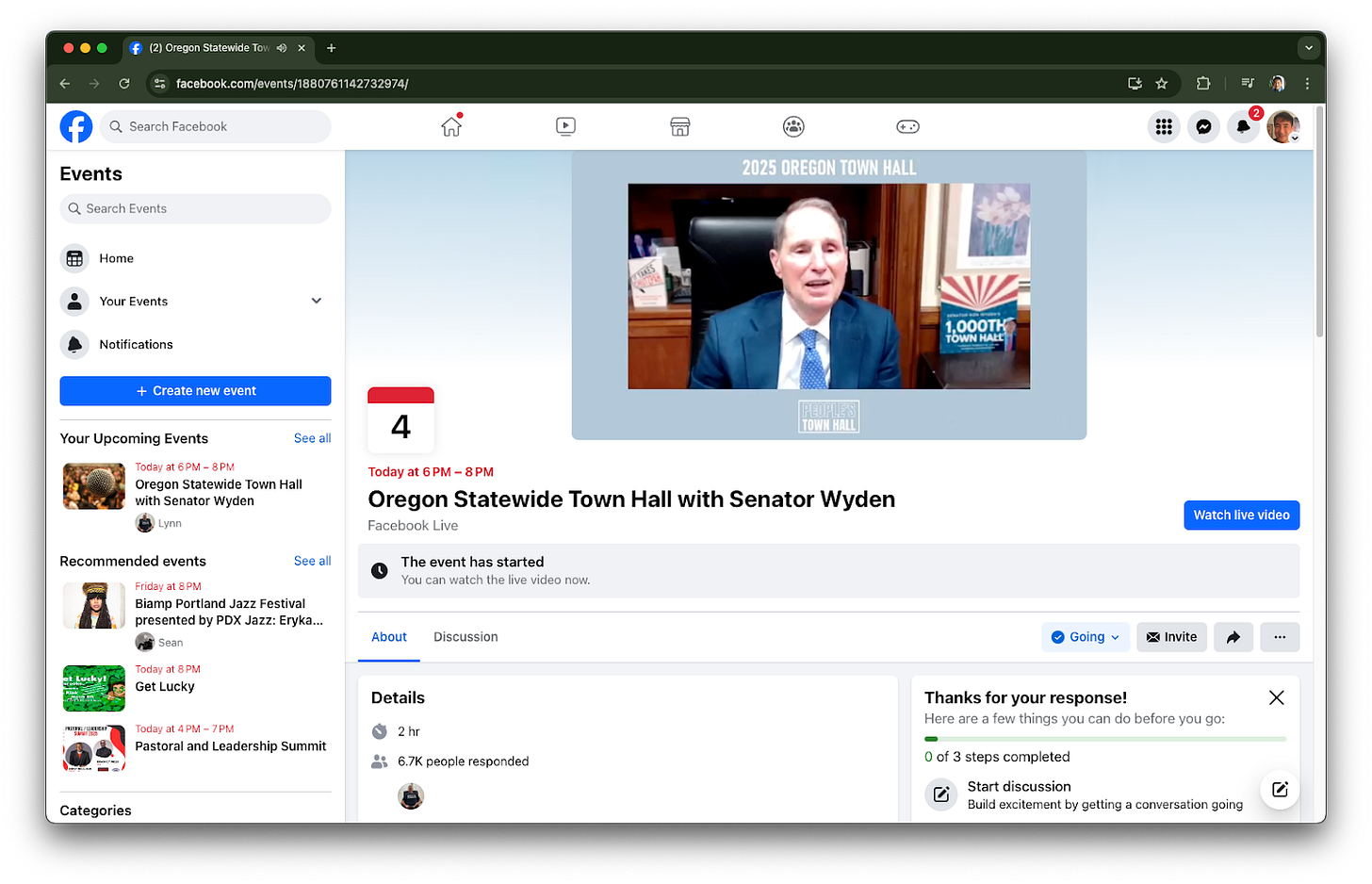
As always, your points, research and analysis are rational and make so much sense! Unfortunately, it seems to me that our country is going through a period where nothing makes sense.
Partisanship and demonizing en masse those in a party other than our own has been made possible by social media and the scrolling/sound byte method by which the majority of Americans get information. If we could all see our common goals are greater than our differences, that would be a great start to the solutions you share.
For the Democrats to actually have influence, they actually have to win! And, ignoring 60% of the country and only promising "more of the same" ain't winning.